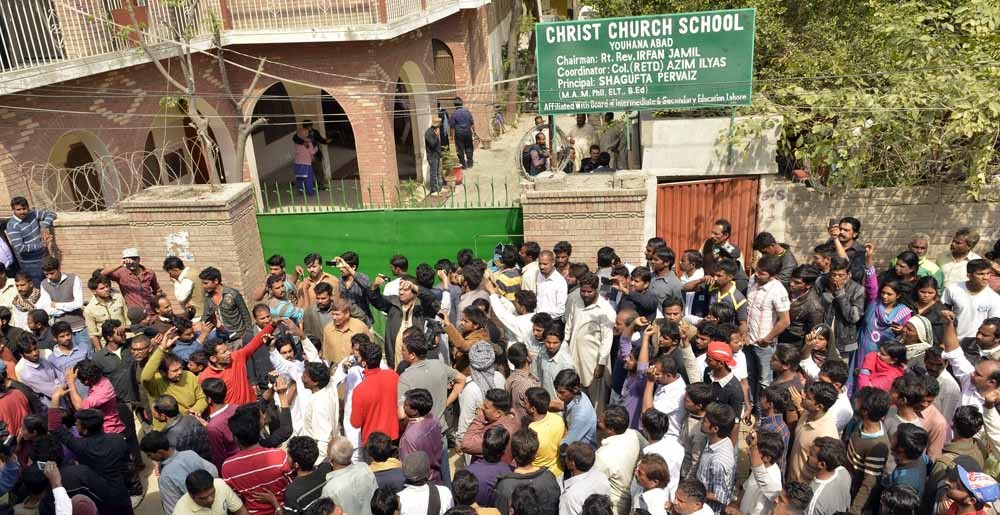
Pakistan’s humanity died a little more this week because we failed to see individuals as humans

Identity gives us a sense of belonging and authenticity. Yet it also divides us -- setting us apart from those we deem ‘the other’. Part of this division helps us be, and feel, a part of a community. Yet when individuals abandon reason, identity (fluid as it is) becomes a potent tool fueling violence and oppression.
The bombing of churches in Lahore last Sunday broke our hearts and destroyed, irreparably, precious lives. Shortly after the bombings a mob turned violent, damaging property and killing multiple individuals -- one of the victims was infact burned alive. Within hours, Youhanabad and Ferozepur Road in Lahore became the hotbed of communal tensions.
Local mosques in the said area, on the second day of violence, called upon the Muslims in the area to come out of their homes to take up arms against "the Christian mob". Social media was abuzz with people mocking Pakistan’s Christian population as a minority perpetrating violence. Others, in an attempt to add the voice of reason, suggested that the mob’s actions represented the violent reaction of an oppressed and victimised community. The context, goes the argument, is relevant. Hence this was not pre-meditated murder but a product of helplessness.
My view is that, notwithstanding the intention behind each of these perspectives, such positions are deeply flawed and exacerbate the problem instead of reducing it. Amartya Sen’s book "Identity and Violence" written many years ago reminds us of what is at stake and how our analysis of identity politics is deeply problematic. Sen’s argument, which I find compelling, is that each one of us has multiple fluid identities. Both these words are important: multiple as well as fluid. The line between these identities is fluid. At any given point in the day we carry multiple identities. But to focus just on one and ignore all other aspects of our identity as well as identity of ‘others’ is deeply problematic.
By calling the mob in Lahore a "Christian mob" we are doing a disservice to all stakeholders and our common humanity. It doesn’t matter whether you condemn the mob or add context to their actions -- as long as you call it a Christian mob you’re part of the problem. I don’t see how anyone can claim that the mob was motivated by religiosity or that all or most members of it were religious people -- adherents of the Christian faith at that.
Those are assumptions because they help you box people in and accord them an ‘identity’. A convenient tool of analysis for you but deeply damaging to the cause of common humanity. A mob is a mob and its violent actions need to be condemned for that reason alone. The religion to which violent individuals belong is not helpful in explaining the violence or, more importantly, controlling it.
Even worse is now demanding answers from the Christian community for the actions of violent individuals. The Interior Minister’s statement that bombings of Imambargahs never resulted in mob violence is downright irresponsible and repulsive. If we in Pakistan use the violent actions of members of a particular faith to taint an entire community then we have no ground to complain the next time anyone in the world adopts, what we deem, "islamophobic" policies or actions.
Also relevant is the myopia inherent in defining an individual only by reference to his/her religion when analysing violence or its causes.
Also read: A grim day and after
Yes, the state has a responsibility to protect minorities. But this is not a license to take away all other identities of individuals belonging to a particular religious denomination. The mob wasn’t "Christian", it was a collection of individuals who broke the law. The unlawful actions in Lahore need not taint the entire Christian community.
They are not just Christians, they might also be (and need to be seen as) Pakistanis, Punjabis, lawyers, accountants, labourers, cricket fans, math lovers, leftists, centrists etc. In effect, they need to be seen as human beings.
Communal violence flowing from religion is particularly dangerous because passions are incited, and fanned, in a way that is designed to drown out any other facet of a human being. Identities, fluid as they usually are, become set in stone. You’re not anything else but a Christian or a Muslim. A mob is Christian or Muslim, not Punjabi or Lahori. A man torched to death is a Muslim, not a glass cutter, a father, a son, a Punabi, a Lahori etc. The person then killed was ‘the other’, not one of their own.
Our concern should be for persecution on the basis of religion -- instead of explaining away violence and then justifying it by reference to individuals belonging to a faith. Every time we do this we chop away at our common humanity. Conflicts aren’t resolved by putting people in different boxes. They can only be resolved by finding common ground. And that common ground here is humanity.
More on: Whitewashing Youhanabad
The bombing of churches is wrong because it targets people on the basis of religion -- because it focuses on one facet of identity and uses that to spread hatred and violence. Murder perpetrated by a mob is wrong because it takes away human life without authority or backing of law. None of this can be justified in terms of religion or by tainting entire communities.
Pakistan’s humanity died a little more this week because we failed to see individuals as humans.
Life is precious because it is life -- not because you celebrate it by going to a temple, a mosque, a Church or a synagogue. Each person attending any of these places of worship deserves respect as a human being. And no individual or collection of community deserves the burden that comes from being defined through a uni-dimensional lens.